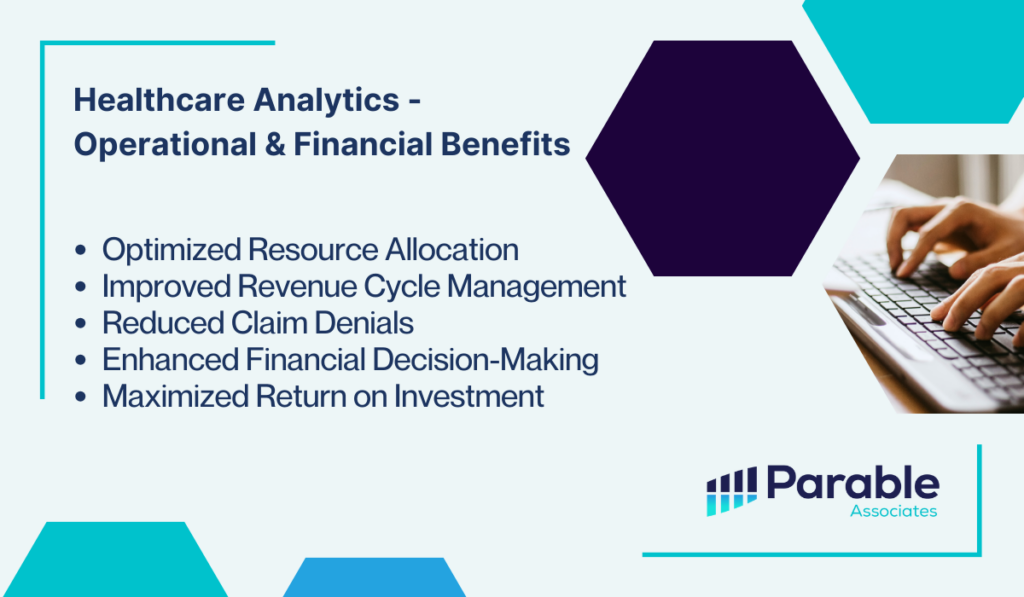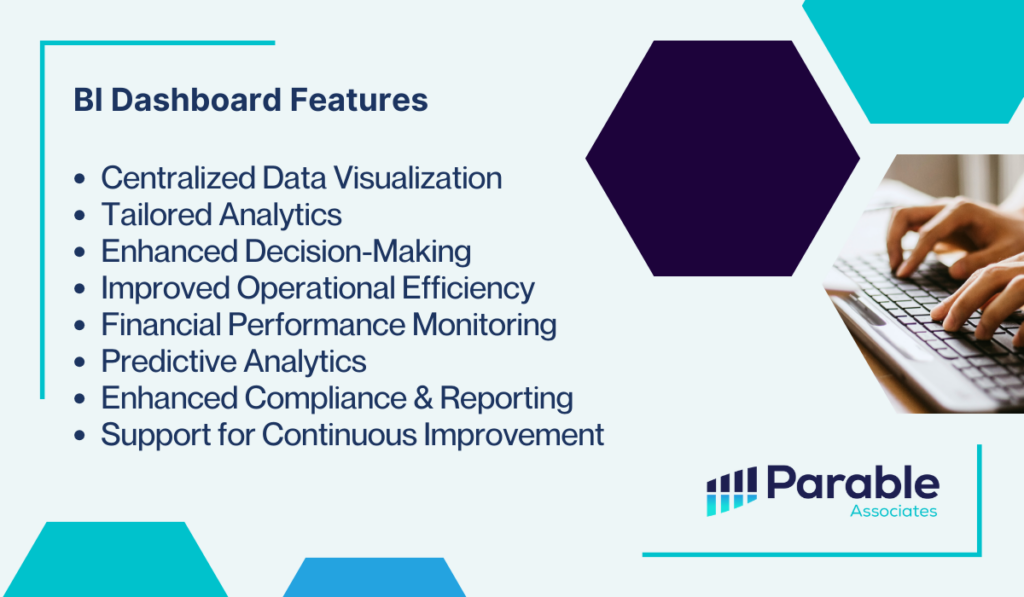Healthcare practices are constantly inundated with data, from patient records and treatment outcomes to operational efficiency and financial performance metrics. This vast sea of information is key to transforming healthcare delivery and organizational efficiency. However, the sheer volume and complexity of healthcare data can be overwhelming. The ability to draw actionable insights and implement effective strategies for improvement requires compiling data from various sources into a cohesive, analytical framework. This framework allows healthcare organizations to understand complex patterns, identify inefficiencies, and address challenges with precision. This is where healthcare analytics solutions come into play, enabling the transformation of raw data into strategic assets.
Understanding Healthcare Analytics Solutions
Healthcare analytics solutions encompass a range of tools and technologies. Business intelligence (BI) stands out as a powerful component of these solutions. BI allows practices to collect data from both internal systems and external sources and then prepare it for analysis. It enables the development and execution of queries against this data and the creation of reports, making analytical results accessible to practice managers and operational staff. BI tools enable healthcare organizations to aggregate, analyze, and visualize data in a way that supports decision-making, enhances operational efficiency, and optimizes financial performance.

Operational and Financial Benefits
Healthcare analytical solutions can pinpoint bottlenecks and inefficiencies within practice operations, spanning appointment scheduling, billing, and administrative tasks. By leveraging data to analyze patterns and trends, practices can refine their processes, minimize administrative delays, and optimize workflow efficiency. This strategic approach enhances the operational aspect of practices and also benefits patient care by ensuring smoother, more efficient service delivery.
Optimized Resource Allocation
Informed Staffing Decisions: BI tools analyze patient flow data to predict busy periods, allowing healthcare organizations to adjust staffing levels accordingly. This ensures enough healthcare providers during peak times for optimal patient care, while also avoiding unnecessary labor costs during less busy periods.
Strategic Equipment Utilization: By monitoring treatment outcomes and equipment usage, BI can help identify which equipment is most in demand and which is underutilized. This can guide investments in new equipment or the reallocation of existing resources to meet patient needs more effectively.
Efficient Facility Usage: Analyzing facility usage data can reveal patterns that allow for better planning of space allocation. For example, if certain departments are consistently overburdened, resources can be reallocated or expanded to accommodate the demand, enhancing overall operational efficiency.
Improved Revenue Cycle Management
Streamlining Billing Processes: Healthcare analytics tools sift through billing and coding data to identify common errors that lead to delays in reimbursement. By pinpointing these issues, organizations can train staff more effectively and adjust their processes to reduce errors and accelerate the billing cycle.
Enhancing Claim Submissions: By analyzing claim submissions, data patterns in denied or delayed claims can be uncovered. This insight allows healthcare organizations to refine their submission processes, ensuring that claims are complete and accurate before submission, thereby reducing the likelihood of denial or delay.
Accelerating Payment Processes: Healthcare analytics solutions can help identify hurdles to overcome in the payment process, such as slow payer responses or inefficient internal processes for handling payments. Streamlining these processes ensures quicker reimbursement, improving cash flow and accelerating the revenue cycle.
Reduced Claim Denials
Root Cause Analysis: Healthcare analytics solutions delve deep into denial data to uncover the underlying reasons for claim rejections. Whether it’s due to coding errors, insufficient documentation, or eligibility issues, understanding these causes enables targeted corrective actions.
Process Streamlining: With insights into why claims are denied, organizations can streamline their claims process to prevent future denials. This might involve additional training for coders, better pre-claim eligibility checks, or enhanced documentation practices.
Enhanced Financial Decision-Making
Financial Health Overview: Comprehensive financial analytics provide a clear picture of an organization’s financial status, highlighting areas of strength and weakness. This holistic view supports better financial decision-making and strategic planning.
Identifying Revenue Opportunities: By analyzing data across various services and departments, healthcare analytics tools can identify areas with potential for revenue growth, such as high-demand services or opportunities for service expansion.
Cost Management: Detailed tracking and analysis of expenses allow organizations to identify areas where costs can be reduced without compromising patient care. This could include renegotiating supplier contracts or reducing medical supply waste.
Maximized Return on Investment (ROI)
Operational Efficiency: Implementing healthcare analytic solutions leads to more streamlined operations, reducing waste and improving service delivery. This contributes to a significant reduction in operational costs, thereby enhancing ROI.
Patient Care Enhancement: By facilitating better resource allocation and streamlining workflows, BI tools indirectly improve patient care. Satisfied patients are more likely to return and recommend the healthcare provider, driving revenue growth.
Financial Performance: The combined impact of reduced claim denials, improved revenue cycle management, and enhanced decision-making lead to a healthier bottom line. By investing in a healthcare analytics solution, organizations can achieve a significant return on investment through improved financial performance.

BI Dashboards – Healthcare Analytics Superpower
A custom BI dashboard is a powerful tool that can significantly enhance the utility of healthcare analytics solutions like ModMed, Experity, or WebPT. By tailoring these dashboards to a healthcare organization’s specific needs and goals, practices can unlock a deeper understanding of their operations, financial performance, and patient care metrics.
Centralized Data Visualization
Healthcare organizations often use multiple systems, such as electronic health records (EHRs), practice management, and patient engagement. A custom BI dashboard can aggregate data from these disparate sources into a unified view. This centralization makes it easier to monitor, analyze, and make decisions based on a comprehensive picture of the organization’s activities.
Tailored Analytics
Every healthcare organization has unique priorities and challenges. A custom BI dashboard can be designed to focus on the metrics that matter most to your practice. Whether it’s tracking patient outcomes, optimizing scheduling, reducing no-show rates, or managing claim denials, a dashboard can be configured to highlight these areas. This tailored approach ensures that the insights you receive are relevant and actionable.
Enhanced Decision-Making
Custom BI dashboards provide real-time data and insights, enabling healthcare providers to make informed decisions quickly. For instance, if there’s an uptick in claim denials from a particular insurer, a dashboard can alert management to this trend, allowing for immediate investigation and resolution. This agility in decision-making can improve financial performance and patient satisfaction.
Improved Operational Efficiency
By Identifying obstacles and workflow inefficiencies, custom BI dashboards can guide operational improvements. For example, analysis might reveal that certain procedures can be streamlined, or that staff allocation can be optimized based on patient volume trends. These insights can lead to better resource utilization, reduced wait times, and an overall improvement in the patient experience.
Financial Performance Monitoring
Custom BI dashboards can track a wide range of financial metrics, from overall revenue and expenses to more granular details like claim denial rates or the profitability of specific services. This financial monitoring capability allows healthcare practices to identify areas for improvement, such as reducing unnecessary costs or enhancing revenue cycle management processes.
Predictive Analytics
Custom BI dashboards can be built to incorporate predictive analytics, using historical data to forecast future trends. This can be invaluable for strategic planning, helping healthcare organizations anticipate changes in patient demand, revenue fluctuations, or the impact of new policies or procedures.
Enhanced Compliance and Reporting
Custom BI dashboards can also help healthcare organizations maintain compliance with regulations and standards by monitoring relevant metrics and alerting them to potential issues before they become problematic. Additionally, they can streamline reporting processes, making it easier to compile and submit necessary documentation to regulatory bodies.
Support for Continuous Improvement
Finally, a custom BI dashboard supports a data-driven culture of continuous improvement within healthcare organizations. By regularly providing clear, data-based insights into performance, dashboards encourage ongoing evaluation and refinement of practices. This iterative process can lead to sustained enhancements in care quality, operational efficiency, and financial health.

Parable Associates – Elevating Healthcare Analytics Solutions
The benefits of healthcare analytics solutions, particularly BI, cannot be overstated. From organizational performance to financial improvements, the right analytics strategy can transform your practice.
Parable Associates specializes in business intelligence that caters to the unique needs of healthcare providers. Partnering with industry-leading platforms like WebPT, Experity, and ModMed, Parable Associates customizes these solutions to fit the specific requirements of each practice.
With our deep understanding of the healthcare landscape and commitment to leveraging the power of BI, Parable Associates helps healthcare organizations harness their data for informed decision-making. Whether it’s identifying areas for operational improvement or optimizing financial performance, our customized solutions provide the insights and tools necessary to implement effective changes. Want to learn more? Schedule a discovery call today!
Healthcare Analytics FAQs
Healthcare analytics solutions encompass tools and technologies that analyze, visualize, and interpret data to provide actionable insights. They help practices enhance operational efficiency, optimize financial performance, and improve patient care by transforming raw data into strategic assets.
BI is a critical component of healthcare analytics, allowing practices to collect, prepare, and analyze data from various sources. It supports the creation of reports and dashboards, making analytical results accessible and actionable for practice managers and operational staff.
Yes, these solutions can pinpoint bottlenecks and inefficiencies within practice operations, such as in appointment scheduling, billing, and administrative tasks. By analyzing data patterns, practices can refine processes to optimize workflow efficiency.
By analyzing billing, coding, claim submissions, and payment data, healthcare analytics tools can identify areas for improvement, reduce billing errors, and accelerate reimbursement processes, thereby enhancing revenue cycle efficiency.
Analytics solutions delve into denial data to uncover reasons for claim rejections, enabling targeted corrective actions. This insight helps streamline the claims process and improve the success rate of claim submissions.
Custom BI dashboards provide real-time data and insights, enabling quick, informed decisions. They can alert management to trends like an uptick in claim denials, allowing for immediate investigation and resolution, which can improve financial performance and patient satisfaction..
Implementing these solutions can lead to significant ROI by streamlining operations, reducing operational costs, improving patient care, and enhancing financial performance, ultimately contributing to a healthier bottom line.
Parable Associates specializes in customizing business intelligence solutions to fit the unique needs of each practice. By partnering with platforms like WebPT, Experity, and ModMed, they tailor solutions to provide relevant insights for informed decision-making and operational improvements.
Yes, custom BI dashboards can incorporate predictive analytics, using historical data to forecast future trends. This aids in strategic planning by helping healthcare organizations anticipate changes in patient demand, revenue fluctuations, or the effects of new policies.
Partnering with Parable Associates ensures practices get tailored BI solutions that address their specific challenges and goals. Their deep expertise in healthcare analytics enables practices to harness their data effectively, leading to operational improvements, enhanced financial decision-making, and better patient care outcomes.

